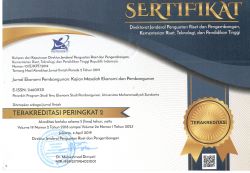STRUCTURAL BREAKS AND BILATERAL EXCHANGE RATE PASS-THROUGH: AN EMPIRICAL CASE OF INDONESIA–UNITED STATES
Arintoko Arintoko(1*)(1) Faculty of Economics Universitas Jenderal Soedirman Kampus UNSOED Grendeng, Purwokerto 53122, Indonesia Phone: +62-281-637970
(*) Corresponding Author
Abstract
This study estimates the exchange rate pass-through into domestic prices in Indonesia in the two-stage approach. The study focuses on first step pass-through, i.e. ERPT into import prices and second step pass-through, i.e. into consumer prices, using cointegration and error-correction mechanism (ECM) model. This research uses a Zivot-Andrews technique to test for structural breaks and Gregory-Hansen models to tests. The results show that the long run ERPT to import prices with structural breaks is relatively low compared to the results without them. The absolut error correction term values resulted from cointegration are decreased and the error-correction models need period lagged longer than one-period if the estimation included the estimated structural breaks. The main finding is that allowing for possible breaks around the crises in Indonesia, and a shift of the exchange rate management from managed to free floating in 1997 helps to restore a long run cointegration relationship estimation.
Keywords
exchange rate pass-trough; structural breaks; cointegration; error-correction mechanism
Full Text:
PDFArticle Metrics
Abstract view(s): 1432 time(s)PDF: 303 time(s)
Refbacks
- There are currently no refbacks.















